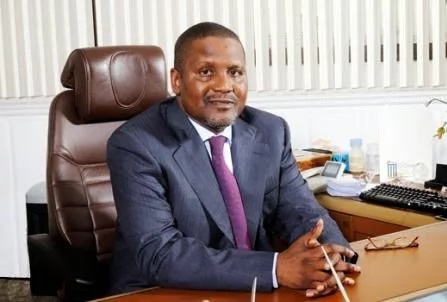
In recognition of his immense contribution to human capital development in Africa through the establishment of businesses across the African continent, a United States of America based Organization, Africa-America Institute (AAI) has honoured the President of Dangote Group, Aliko Dangote with the “2016 African Business Leader Award.”
The business guru was named and presented the award at a colourful ceremony held on the side-line of the United Nations Congress held in New York city, United States alongside other prominent Africans like Stephen Hayes, President and CEO of the Corporate Council on Africa (CCA), who won the AAI ‘2016 U.S. Business Leader Award’; and Sunil Benimadhu, Executive Director of the Stock Exchange of Mauritius (SEM), who won the AAI ‘2016 Distinguished Alumnus Award.’
Dangote said he was humbled by the award considering the pedigree of the award which celebrates African achievement at the global stage and promised that he would not be deterred by the current economic challenges in Nigeria but would intensify the expansion of his businesses across Africa.
At the award Gala themed “Education: The Key to Africa’s Economic Growth,”, Dangote expressed delight that the Institute broughteducation in Africa to the front burner., noting “I have always been passionate about education because I believe it is a weapon of liberation.
Drawing a reference from a Nelson Mandela quote that: “Education is the most powerful weapon which you can use to change the world.”, the Chairman of Dangote Cement, global, said he identified himself with laudable initiatives that seek to promote educational growth and development, particularly in Africa.
“As a matter of fact, I am a founding member of the Gordon Brown-led Global Business Coalition for Education. Education is also one of the cardinal areas that the Aliko Dangote Foundation focuses on. I believe quality and affordable education will address the immense social and economic inequalities that often breed discontent in many parts of Africa. I also believe education will strengthen the human capital that will drive Africa’s development in the 21st Century.
“I am happy to note that AAI has been contributing to Africa’s development, through training and education, since it was founded 63 years ago. This award is coming at a time the Dangote Group is rapidly expanding its footprints across Africa, and into new sectors.
“Last year alone, we commenced cement operations in Ethiopia, Zambia, Cameroon, South Africa, Senegal and Tanzania. By 2019, we will have operations in 18 countries with a total capacity of nearly 80MMTPA, thus making us the largest cement producer in Africa and the 6th largest in the world.
“Over the next few years, we will be investing nearly $20billion in projects ranging from a petroleum refinery, petrochemicals, fertiliser, gas pipeline, and backward integration in sugar and rice production. These projects will create over 250,000 jobs and provide foreign exchange earnings and savings of $16billion for the country and help diversify our economy. Central to this developmental trajectory is the need for capacity building and ramping up of the quality of skills of a fast growing African workforce.
“Despite the current economic challenges, we will continue to scale up the value of our investments not only in Nigeria but also across the entire continent, because we believe in Nigeria’s and Africa’s potential. We believe that it is only by sustained massive investments in infrastructure across the continent, supported with access to education, that Africa can reach its full potential.
“This award will further encourage us to redouble our efforts as we work towards promoting Africa’s economic renaissance. We are grateful to the organisers for recognising our modest efforts to transform Africa”, He stated.
Founded in 1953, The Africa-America Institute (AAI) is a premier U.S.-based international organization dedicated to strengthening human capacity of Africans and promoting the continent’s development through higher education and skills training, convening activities, program implementation and management.
Its primary model is to identify capacity-building projects and coordinate the programmatic, financial administration and evaluation necessary to deliver high-impact results.
Source: Naij